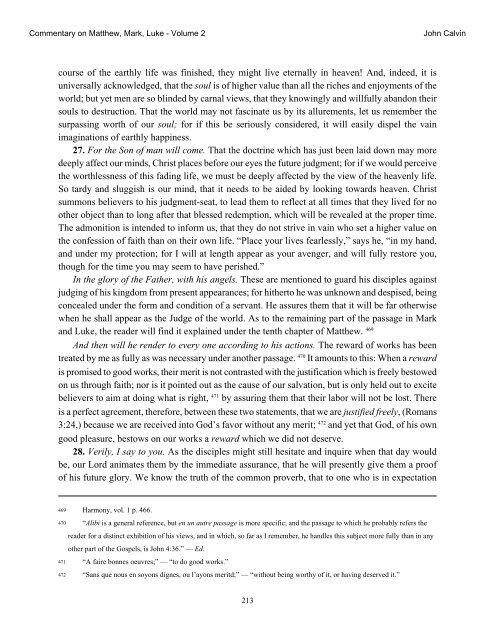Commentary on Matthew, Mark, Luke - Volume 2.pdf
Commentary on Matthew, Mark, Luke - Volume 2.pdf
Commentary on Matthew, Mark, Luke - Volume 2.pdf
Create successful ePaper yourself
Turn your PDF publications into a flip-book with our unique Google optimized e-Paper software.
<str<strong>on</strong>g>Commentary</str<strong>on</strong>g> <strong>on</strong> <strong>Matthew</strong>, <strong>Mark</strong>, <strong>Luke</strong> - <strong>Volume</strong> 2<br />
course of the earthly life was finished, they might live eternally in heaven! And, indeed, it is<br />
universally acknowledged, that the soul is of higher value than all the riches and enjoyments of the<br />
world; but yet men are so blinded by carnal views, that they knowingly and willfully aband<strong>on</strong> their<br />
souls to destructi<strong>on</strong>. That the world may not fascinate us by its allurements, let us remember the<br />
surpassing worth of our soul; for if this be seriously c<strong>on</strong>sidered, it will easily dispel the vain<br />
imaginati<strong>on</strong>s of earthly happiness.<br />
27. For the S<strong>on</strong> of man will come. That the doctrine which has just been laid down may more<br />
deeply affect our minds, Christ places before our eyes the future judgment; for if we would perceive<br />
the worthlessness of this fading life, we must be deeply affected by the view of the heavenly life.<br />
So tardy and sluggish is our mind, that it needs to be aided by looking towards heaven. Christ<br />
summ<strong>on</strong>s believers to his judgment-seat, to lead them to reflect at all times that they lived for no<br />
other object than to l<strong>on</strong>g after that blessed redempti<strong>on</strong>, which will be revealed at the proper time.<br />
The adm<strong>on</strong>iti<strong>on</strong> is intended to inform us, that they do not strive in vain who set a higher value <strong>on</strong><br />
the c<strong>on</strong>fessi<strong>on</strong> of faith than <strong>on</strong> their own life. “Place your lives fearlessly,” says he, “in my hand,<br />
and under my protecti<strong>on</strong>; for I will at length appear as your avenger, and will fully restore you,<br />
though for the time you may seem to have perished.”<br />
In the glory of the Father, with his angels. These are menti<strong>on</strong>ed to guard his disciples against<br />
judging of his kingdom from present appearances; for hitherto he was unknown and despised, being<br />
c<strong>on</strong>cealed under the form and c<strong>on</strong>diti<strong>on</strong> of a servant. He assures them that it will be far otherwise<br />
when he shall appear as the Judge of the world. As to the remaining part of the passage in <strong>Mark</strong><br />
and <strong>Luke</strong>, the reader will find it explained under the tenth chapter of <strong>Matthew</strong>. 469<br />
And then will he render to every <strong>on</strong>e according to his acti<strong>on</strong>s. The reward of works has been<br />
treated by me as fully as was necessary under another passage. 470 It amounts to this: When a reward<br />
is promised to good works, their merit is not c<strong>on</strong>trasted with the justificati<strong>on</strong> which is freely bestowed<br />
<strong>on</strong> us through faith; nor is it pointed out as the cause of our salvati<strong>on</strong>, but is <strong>on</strong>ly held out to excite<br />
believers to aim at doing what is right, 471 by assuring them that their labor will not be lost. There<br />
is a perfect agreement, therefore, between these two statements, that we are justified freely, (Romans<br />
3:24,) because we are received into God’s favor without any merit; 472 and yet that God, of his own<br />
good pleasure, bestows <strong>on</strong> our works a reward which we did not deserve.<br />
28. Verily, I say to you. As the disciples might still hesitate and inquire when that day would<br />
be, our Lord animates them by the immediate assurance, that he will presently give them a proof<br />
of his future glory. We know the truth of the comm<strong>on</strong> proverb, that to <strong>on</strong>e who is in expectati<strong>on</strong><br />
469 Harm<strong>on</strong>y, vol. 1 p. 466.<br />
470 “Alibi is a general reference, but en un autre passage is more specific; and the passage to which he probably refers the<br />
reader for a distinct exhibiti<strong>on</strong> of his views, and in which, so far as I remember, he handles this subject more fully than in any<br />
other part of the Gospels, is John 4:36.” — Ed.<br />
471 “A faire b<strong>on</strong>nes oeuvres;” — “to do good works.”<br />
472 “Sans que nous en soy<strong>on</strong>s dignes, ou l’ay<strong>on</strong>s meritd;” — “without being worthy of it, or having deserved it.”<br />
213<br />
John Calvin

















